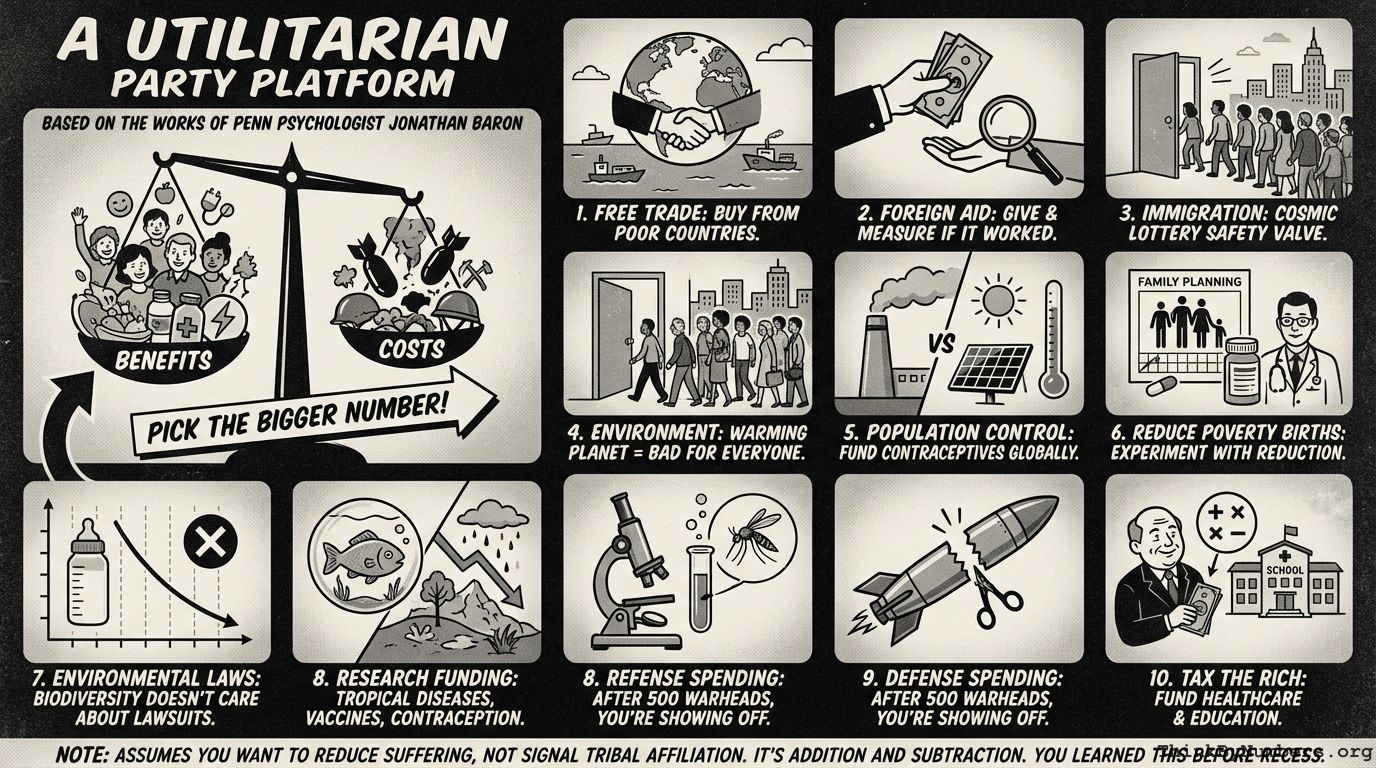Penn psychologist Jonathan Baron wrote a political platform based on a simple question: What if you tried to help people instead of signaling tribal affiliation?
The math is third-grade level. Count everyone. Add benefits. Subtract costs. Pick the bigger number.
Here's the platform:
1. Free Trade (With Exceptions You Can Count on One Hand)
Buy stuff from poor countries. They need the money more than you need to feel good about "buying local." Your locally-sourced artisanal whatever costs papers with dead presidents. Their export economy prevents actual death.
2. Foreign Aid (That Actually Works)
Rich countries give money to poor countries. Then you measure if it worked. Revolutionary, apparently. The World Bank has data on aid effectiveness. Use it.
3. Immigration (Because Birth Location Is Random)
The biggest determinant of your life outcome is which country you were born in. You had zero control over this. Immigration is a safety valve for the cosmic lottery. Yes, there's a brain drain problem. That's still better than a brain-staying-in-poverty problem.
4. Environment (The Whole Planet, Not Just Your Lawn)
Climate change doesn't care about national borders. Your individual recycling habit is adorable. Converting to renewable energy actually matters. Third-grade math again: warming the entire planet = bad for everyone.
5. Population Control (Before Nature Does It For You)
Too many humans makes everything harder. Rich countries should fund contraceptives, abortion, and sterilization globally. You can use mild incentives now or Draconian incentives later. History suggests you'll choose poorly and wait for later.
6. Reduce Poverty Births
In the U.S., children born to teenagers and single mothers in poverty have measurably worse outcomes. You can experiment with reducing these births or keep pretending this isn't happening. Your choice. Data exists on what works.
7. Environmental Laws (Less Litigation, More Actual Environment)
Current laws are simultaneously too rigid and not rigid enough. You protect some things excessively while fish populations collapse. Biodiversity doesn't care about your lawsuits.
8. Research Funding (For Things That Actually Help)
Fund research on tropical diseases, vaccines, contraception, and agriculture for poor countries. Rich countries already have pills for everything. Poor countries have malaria.
9. Defense Spending (After the First 500 Nuclear Warheads, You're Showing Off)
Cut the defense budget. Encourage other countries to cut theirs. Support U.N. peacekeeping instead. You named your war department after a geometric shape. Like calling a hospital "Rectangle."
10. Tax the Rich, Fund Healthcare and Education
Universal healthcare paid by ability to pay. Decide coverage by cost-effectiveness, not by lobbying budget. Tax the rich more. Fund education. None of this is complicated.
How to Pay for This
Cut defense spending. Cut corporate subsidies. Tax carbon-based fuels that you can only burn once. The math is addition and subtraction. You learned this before recess.
Note: This platform assumes you actually want to reduce suffering rather than signal which team you're on. If you prefer the current system where you trade papers with dead presidents to make weapons while people die from preventable diseases, you can keep that. It's working exactly as designed.



Comments